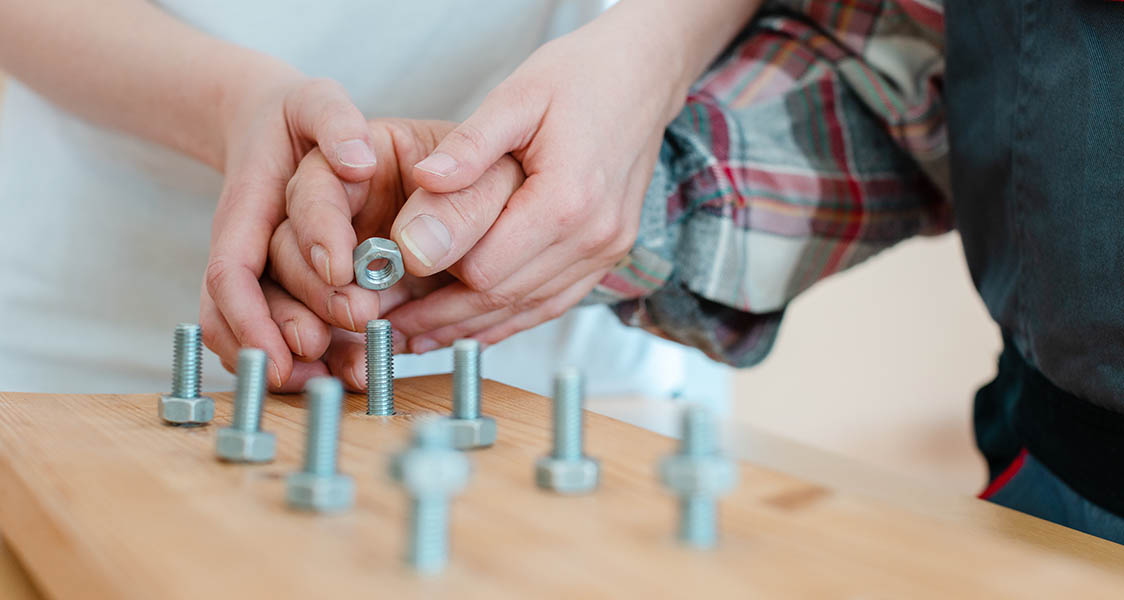Gina Daniels, MS, OTR/L is an Occupational Therapist on the Inpatient Psychiatry Unit at Pennsylvania Hospital. As the only occupational therapist assigned to the psychiatry unit, Gina manages multiple occupational therapy sessions throughout the day. While patients are receiving the psychiatric care that they need, occupational therapy provides an opportunity for them to practice and enhance skills that are used in their everyday life.
What does an occupational therapist do in a psychiatric unit?
As an occupational therapist, my role is to design and implement group sessions based on the population, their needs, and their functional level. Group therapy session provide a continued structure of to the patient’s day, which helps them learn life skills and activities they can do outside of the hospital. The group therapy sessions benefits patients because they are able to further develop life, coping, and leisure skills that they can continue to engage in outside of the hospital.
How do occupational therapists treat patients?
My primary focus in treating patients as an occupational therapist includes increasing their overall functional status specific to their individual diagnosis and primary symptoms. This is critical in further establishing their own personal coping skills for post- discharge, decreasing symptoms, and further developing their overall life skills. I work on developing these skills in group sessions using various and dynamic therapeutic group techniques and activities.
Depending on the population is how I determine my group structure and tasks. With higher functioning groups, I have coping skill groups with them where they can work on life skills worksheets, coping skill building, and other various tasks that aim to increase their functional status. For example, one session might focus on goal setting, where we discuss the importance of goals and how to appropriately establish and achieve them. With lower functioning groups, I adjust my treatment to the patients’ specific abilities and may need to present a simpler task that has cognitive components entwined in the activity.
How do you work together with the other clinicians in the unit to provide an overall system of care?
I actually fell in love with the treatment team as a student. I remember being so impressed with how everyone on the team worked together towards a common goal of getting patients as healthy and stable as possible. Our entire team has very open communication and I really appreciate working in a place with people like that.
We have team meetings every day where we go over every single patient, reviewing their treatment plan, any medication changes and discharge planning. This is also a time where I discuss the group sessions and patient participation or if something stood out in the group sessions that the team should be aware of.
What is your favorite part of working in as an occupational therapist in an inpatient psychiatric unit?
I really like the fact that I come in every day to a new case load and different groups. The quick paced environment and variety of cases from day-to-day keeps me on my feet in a really good way. And I am constantly learning. No two cases involving a diagnosis, like Schizophrenia, are alike. Being able to use my skill sets to plan all the groups by figuring out the best course of action makes me feel good about my work.
I personally do not know of any other occupational therapists in a psychiatric unit. I know they exist, but there are not many in the area. I love the responsibility I have. I love being able to provide a structured part of their day where they can learn, develop skillsets, socialize, and have fun. I really enjoy thinking about what they would truly enjoy and what would they benefit from doing. Patients do not always love the coping skill or talking groups but I know that it is what is needed to further prepare them for a successful discharge and life outside of the hospital.
What can patients expect from occupational therapy in an inpatient psychiatric unit?
A lot more goes into a group session than what meets the eye, there are analytical and clinical reasons behind each of the activities I do with patients. Many people including my patients may never understand that I am making them, for example, play a cognitive based game so that I can see their sequencing, socialization skills or assess their attention span along with several other factors.
How does occupational therapy help patient progress?
I would love to take all the credit, but it’s really a combination of the treatment I work with and medication management in addition to the therapeutic activities that are presented during group sessions that can amount to a patient’s success on the unit. As their condition improves I truly see them becoming less symptomatic, more interactive, brighter in affect, and more engaged overall in their own treatment and progress. It is ultimately very rewarding to see and makes me feel as though I was successful at implementing purposeful and productive groups with these individuals.

